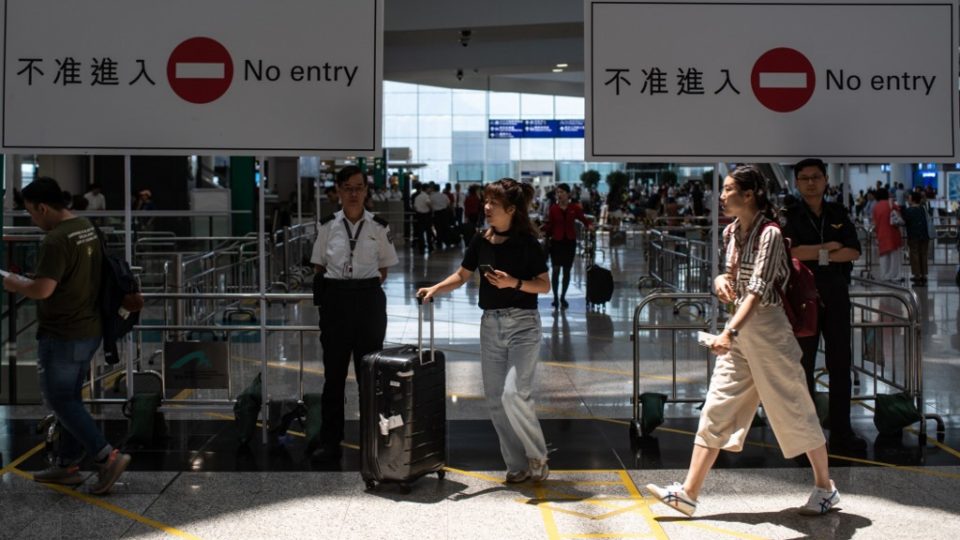Members of Hong Kong’s pro-democracy movement found themselves doing some soul searching today after a night of chaos at the city’s airport, as off-putting and widely circulated scenes of protesters tussling with emotional passengers, impeding paramedics, and even taking and beating prisoners forced many to take stock of rare a PR setback.
In the online forums where much of the discussion, and organization, of the city’s protest movement takes place, users were debating whether yesterday’s actions crossed a line, with some even suggesting ground rules to prevent similarly ugly incidents going forward.
At the same time, protesters online and in person scrambled to issue mea culpas to inconvenienced passengers, hassled journalists, and airport staff, promising to “learn from our mistakes.”
“Please give us a second chance to proves [sic] ourselves we can be better.”
https://twitter.com/austinramzy/status/1161468392114573312?s=20
Another apology circulating online alluded to the mental toll police’s stepped-up tactics in quelling protests had taken, saying protesters had “moved from fighting for our core values to having to fend for our lives.”
“[A]fter months of prolonged resistance, we are frightened, angry and exhausted,” the statement continues. “Some of us have become easily agitated and over-reacted last night. For this we feel pained and dispirited and would like to express our most sincere apologies.”
A handful of protesters brought the apology tour into the real world, turning up with signs reading, among other things, “Sorry for inconvenience; HK is sick,” and bowing deeply to passengers.
[LIVE] Protesters are apologising for the inconvenience caused to the travellers at @hkairport. #FreedomHK #antiELAB #StandWithHK #HongKongProtest #HongKong pic.twitter.com/3olDF2EDqr
— Freedom HK (@FreedomHKG) August 14, 2019
In forums like LIHKG, meanwhile, users went back and forth on whether so-called “frontline” protesters had crossed a line.
Referring to yesterday’s blockade of the airport’s terminals, which saw scores of flights cancelled and delayed, some argued that blocking travelers was “useless” and would only stir up animosity. Others, however, countered that uncooperative movements require sacrifices, and cited the jailed pro-independence activist Edward Leung Tin-kei in saying that chaos in society is caused by those in power, not those who resist.
“We are now trying to push the government to respond, and to stop flight departures is one way,” one post read. “If there are more travel warnings against HK, then it can put pressure on the government.”
Netizens also debated whether it was acceptable to detain “mainland officials” that were found among protesters. Last night one mainlander — described as a traveler by Hong Kong officials and Chinese media, but accused of being an undercover Shenzhen cop by protesters at the scene — was detained, bound, and even reportedly marched around the arrivals hall and beaten.
https://twitter.com/jgriffiths/status/1161252153245216773?s=20
Protesters reportedly impeded first responders’ efforts to treat another man who was similarly bound and beaten for being a suspected “spy.”
The man was later identified as a staffer for the Beijing-backed tabloid the Global Times, which has been a vociferous critic of the protest movement.
https://twitter.com/JeromeTaylor/status/1161309234052521984
The incidents prompted a number of netizens to suggest a set of “ground rules” in line with international law, which would include not obstructing journalists and paramedics, not assaulting civilians, and not attacking so-called “mainland undercovers” once they were detained.
One set of proposed guidelines making the rounds reads, “Do not deliberately attack persons suspected of being ‘ghosts’” — using a slang term that refers to imposters and spies. The next item admonishes protesters to gather evidence of the imposters and furnish it to the media rather than attacking.
Some ground rules now circulating for #antiELAB protesters after the events of last night
1) Protect and do not obstruct journalists’ work
2) Protect and cooperate as quickly as possible with paramedics’ work
3) When encountering a suspected spy, do not recklessly attack pic.twitter.com/yY9BOtIsyX
— Aaron Mc Nicholas (@aaronMCN) August 14, 2019
Most agreed that such ground rules were constructive, and that protesters should remind each other not to be too impulsive. However, suspicions and paranoia have been running even higher that usual among the camp since Sunday, when police for the first time deployed undercover officers disguised as activists to make arrests.
Indeed, some netizens appeared reluctant to accept that protesters had been responsible for the violence at all, suggesting that the people who had roughed up the detained men may have been “ghosts” themselves — double agents, in effect, meant to smear protesters’ image.
As of this morning, however, the dominant theme of the conversation appeared to be one of reflection, with users reminding their comrades not to “blindly support” all the actions of frontline protesters.
“If there are mistakes then we should look into it,” one post said, calling on others not to greet every piece of constructive criticism with accusations of “dividing the protesters.”
Meanwhile, the debate over yesterday’s actions also spilled into the political sphere today, with pro-dem supporters of the movement offering measured critiques, and their pro-Beijing counterparts claiming the chaos as evidence of protesters’ “true colors.”
“We cannot expect strangers to help us to solve our own problems, and we cannot violate visitors’ rights to leave Hong Kong just because we need to fight for our own freedom,” pro-dem convenor Claudia Mo told reporters, referring to the terminal blockade.
“The violent actions that happened at the airport were wrong,” she also noted. “But the protesters have acknowledged their mistake and expressed their remorse… and we accept that.”
DAB lawmakers Starry Lee and Elizabeth Quat, however, were quick to seize on the opportunity to slam the movement.
“I am shocked and angry and ashamed to be a Hongkonger to see Hongkongers bullying foreign visitors and illegally detaining mainland tourists and reporters,” she said. “Claudia Mo tried to find excuses, claiming that they turned to violence because of the police, but we can see that protesters turned violent even when there weren’t any police.”
Additional reporting by Cheryl Ho.




